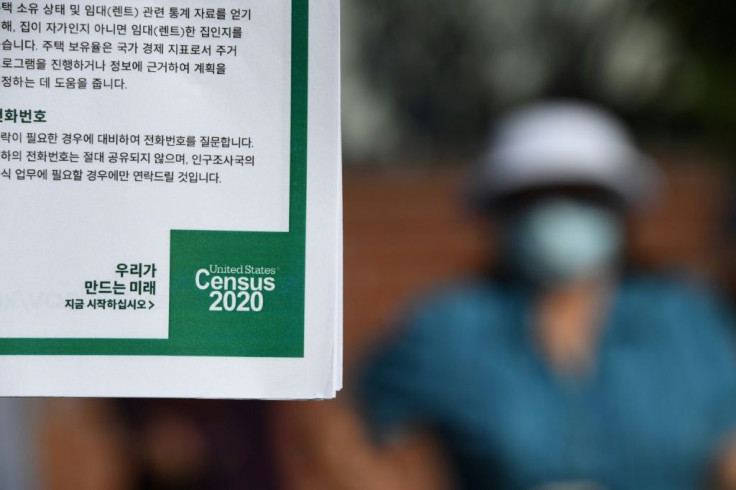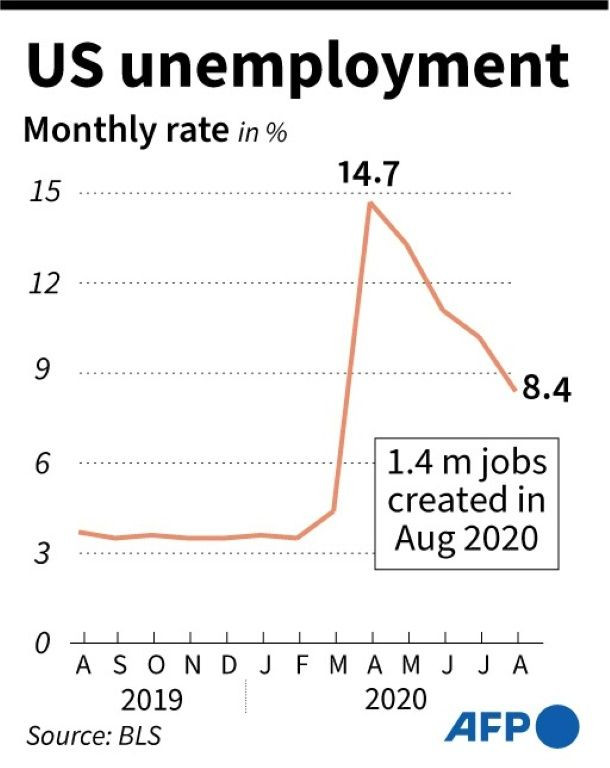US Unemployment Rate Drops To 8.4 Percent But Recovery Slows
The US economy added 1.4 million jobs in August and the unemployment rate fell to 8.4 percent as the country emerged from pandemic lockdowns, but the data shows the recovery is losing steam.
The drop in the unemployment rate from 10.2 percent in July as reported by the Labor Department on Friday was welcome news for President Donald Trump, who called it "an incredible number" as he faces a tough fight for a second term in the November election.
Federal Reserve Chair Jerome Powell also called the report "a good one" in an interview with National Public Radio, but said it would not shake the central bank from its strategy of keeping interest rates lower for longer since the recovery will take time.
"We think that the economy's going to need low interest rates, which support economic activity, for an extended period of time," he said. "It will be measured in years."
Nearly a quarter of the August employment gains were in government jobs, particularly temporary work for the 2020 census, and employment in the world's largest economy remains 11.5 million positions or 7.6 percent below the level in February, before the coronavirus pandemic struck.
Without the census hiring, analysts warn that August's report is actually weaker than it appears, with key industries hiring at a slower pace and permanent layoffs increasing, while the White House and Congress remain deadlocked on a new aid package that could get the economy back on track.

Private employers rehired just one million workers, and so far have regained less than half the jobs lost in March and April.
"The recovery is rapidly decelerating and we still have half of the lost jobs to get back. That shouldn't be happening," Adam Ozimek, chief economist at freelancing platform Upwork, said on Twitter.
The United States has seen tens of millions of layoffs since businesses shut down in mid-March to stop the spread of the virus, and new claims for jobless benefits averaged nearly one million every week in August.
Congress passed the $2.2 trillion CARES Act in the pandemic's early days to blunt the economic downturn, but key provisions of that law have expired.

"Without additional federal support, this is an emergency with no end in sight," said Democratic lawmaker John Yarmuth, chairman of the House Budget Committee.
Workers have benefited from state moves to loosen lockdown restrictions even as the virus remains rife, and the employment report showed the number of people on temporary layoff decreased by 3.1 million to 6.2 million, well below the peak of 18.1 million in April.
However, the number of permanent job losses also increased by 534,000 to 3.4 million, and Lydia Boussour of Oxford Economics warned that indicates "a trend of slower, grinding growth (that) is worrisome for the broader recovery and points to increased scarring effects from the crisis."
Public sector jobs made up a quarter of the overall gains in the report, with 344,000 new jobs total, 238,000 of which were for the census. The government has hired nearly 600,000 workers in the past two months alone.
The leisure and hospitality sector, one of the hardest hit by the business closures, saw growth of 174,000 jobs, with three quarters of that coming from food service and drinking places.
Retail, which has seen a strong recovery from the downturn, added 249,000 in August, but manufacturing jobs increased by just 29,000.
All told, private sector hiring in August was at its slowest pace since May, and it would take 10 months at this pace for employment levels to return to where they were before the pandemic, Ian Shepherdson of Pantheon Macroeconomics said.
Robert Frick, corporate economist at Navy Federal Credit Union, called the August report "a big win for American workers" but acknowledged rehiring will probably occur at a slower rate in the coming months -- if it happens at all.
"Now we'll be battling permanent layoffs once thought to be temporary, bankruptcies, secondary layoffs and maybe major layoffs in the airline industry," Frick said.
© Copyright AFP 2024. All rights reserved.




















